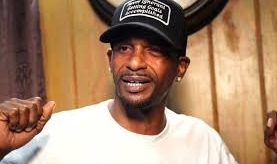Charleston White Went Overboard With This One

🚨 What started as a heartbreaking story about a promising young athlete’s death has now spiraled into one of the most disturbing internet moments of the year — and Charleston White is at the center of it.
🎯 The Tragedy Behind the Story
Kairen Lacy, a former LSU wide receiver, was on the verge of achieving his lifelong dream — an NFL career — when his life took a devastating turn.
In late 2024, Louisiana police alleged that Lacy caused a fatal car crash while driving his green Dodge Charger. Headlines across the country painted him as a reckless driver responsible for a man’s death.
But weeks later, the truth came out — and it told a completely different story.
Surveillance footage proved that at the moment of impact, Lacy’s car was over 70 yards behind the crash — in his lane and nowhere near the collision. Even the district attorney’s office admitted there was no proof Lacy caused the crash.
By then, however, the damage was irreversible.
Lacy had already been judged by the public, dragged online, and branded a killer.
His mental health collapsed under the pressure — and shortly after, Kairen Lacy took his own life.
💔 A Family in Mourning — and Then, Charleston White
While the Lacy family was still mourning and the truth was finally emerging, Charleston White went live online — and said the unthinkable.
He mocked the tragedy.
He called Lacy “weak,” said he “deserved death,” and claimed he would “rot in hell.”
Then, in a shocking escalation, he even insulted Lacy’s mother and supporters — laughing about suicide as if it were entertainment.
It wasn’t commentary. It was cruelty for clicks.
👀 The Internet Reacts
Social media erupted in outrage.
Clips of Charleston’s rant spread rapidly, with users across TikTok, X (Twitter), and Instagram condemning his words.
Even his usual defenders — those who often justify his “truth-telling” persona — agreed he’d gone too far this time.
“He’s lost his soul for clout,” one user wrote.
“Turning suicide into content is evil,” another commented.
The backlash was swift and widespread, with thousands calling for platforms to suspend his accounts and advertisers to cut ties.
🔥 What Really Happened — The Facts
Court documents and verified attorney statements now confirm:
-
Kairen Lacy did not cause the accident.
-
He was not involved in a hit-and-run.
-
He was falsely accused.
In fact, new evidence revealed that investigators guided witnesses during questioning — shaping their responses to fit a false narrative.
So when Charleston White used that lie to attack Lacy posthumously — calling him “weak” and “deserving” of death — he wasn’t exposing truth.
He was amplifying the very falsehood that destroyed the young man’s life.
💬 The Bigger Issue: Outrage as Entertainment
This controversy exposes something deeper — a growing sickness in internet culture.
Every week, tragedy becomes clickbait. Pain becomes performance. Humanity gets lost behind hashtags and hot takes.
Charleston White has built his brand on shock value — but this time, it wasn’t edgy commentary. It was exploitation.
He even tried to cloak his cruelty in religion, claiming the Bible condemns suicide. But theologians and pastors quickly pointed out: the Bible says no such thing.
What it does condemn, however, is bearing false witness and using words to harm others — exactly what Charleston did.
⚡ Public Outcry and Accountability
Across the South — particularly in Louisiana and within LSU’s fan community — people are demanding accountability.
Many want police departments investigated for mishandling Lacy’s case. Others are urging Charleston White to issue a public apology for his “inhumane” comments.
But so far, he’s done the opposite.
Instead of showing remorse, he’s doubled down, claiming “people are too emotional” — proving once again that controversy remains his currency.
🎭 The Real Tragedy
Kairen Lacy wasn’t “weak.”
He was a young man crushed by lies and the unbearable weight of public shame.
He was failed by a system that rushed to label him guilty, and then mocked by a culture too addicted to outrage to see the truth.
He was 23 years old — a son, a brother, a teammate — whose life could have changed the world, but instead became a cautionary tale.
🚨 Bottom Line
Charleston White didn’t “speak truth.”
He desecrated it.
He turned the death of an innocent man into viral content and mocked a grieving family for views.
And the worst part?
The internet rewarded him for it.
💬 Final Takeaway:
In a world chasing clout over compassion, moments like this reveal just how far humanity is slipping.
Every time someone like Charleston White crosses the line — and we watch, share, or laugh — we all become part of the problem.
👉 For more cultural news and commentary, visit The Urban Spotlight Homepage
👉 For verified updates on the Kairen Lacy case, check out local Louisiana coverage on WAFB News





Leave a Reply
Want to join the discussion?Feel free to contribute!